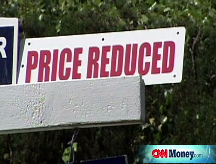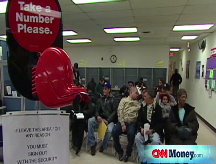Obama closing in on stimulus plan
Summers and Biden vow: Economic recovery funds will not be used for 'make work' projects. A key remaining issue is the size of the package.
NEW YORK (CNNMoney.com) -- President-elect Barack Obama's economic team and congressional staffers are close to finalizing a massive recovery proposal but are still hammering out details, Vice President-elect Joe Biden and economic adviser Larry Summers said Tuesday.
One of the principal remaining issues is the price, which was estimated last week to go as high as nearly $800 billion.
"There's overall agreement on the scope and nature of the investment we are going to be making," Biden said at a meeting of Obama's top economic advisers in Washington, D.C. "While our short-term goal is to start creating jobs as quickly as possible, we plan to invest in areas...that will produce long-term benefits for the long-term health of our economy."
Specifically, the package will call for investments to be made in health care, energy, education and infrastructure, Biden said.
One example of a long-term investment with short- and long-term job potential, Biden said, is the development of 'smart grids,' which would transport electricity by way of wind and solar energy.
A coalition including utility industry players and environmental groups has asked Obama to commit $1 billion in stimulus money for smart-grid efforts, but the ultimate cost of fully modernizing the grid is estimated to be as high as $2 trillion.
The stimulus package will also provide funds to help the jobless and the middle class.
"It's going to provide a down payment on the tax relief that we promised for the strapped middle class," Biden said.
During the campaign, Obama promised, among other things, to offer a "Making Work Pay" credit for the middle class worth $500 per worker ($1,000 per couples filing jointly). It's still not clear if that's the amount of money that would be offered in the economic recovery package and what income thresholds would apply.
Biden noted that aid would be provided for the "most economically vulnerable" who can't find work. The likely provisions: increased unemployment benefits, higher food-stamp payments and aid to states to subsidize Medicaid costs, which will rise as more people lose their jobs and their healthcare insurance along with them.
To address the concerns of bailout-weary lawmakers and taxpayers, Biden and Summers stressed that the money spent on stimulus will be monitored closely.
"Each of the investments undertaken will be carefully evaluated before it is undertaken to make sure it is a rational investment, not simply a make-work project," said Summers, a former Treasury secretary who will head Obama's National Economic Council.
Summers noted the Internet may be used to ensure transparency and track projects' progress. "And there will be accountability for the success in carrying out those investments," he said.
Biden also said repeatedly that the package will be earmark-free.
"I know it's the Christmas season, but President-elect Obama and I are absolutely, absolutely determined that this economic recovery package will not become a Christmas tree," Biden said. "Every dollar will be closely watched to make sure it's being used in an effective manner."
That may be a hard promise to keep once Congress incorporates Obama's proposals into stimulus legislation - which it's expected to do in January.
Then again, it's Christmas, and the Obama team can certainly put an earmark-free bill on their wish list for Santa. ![]()



